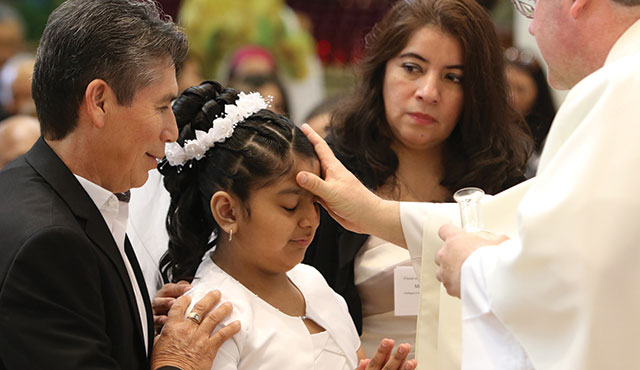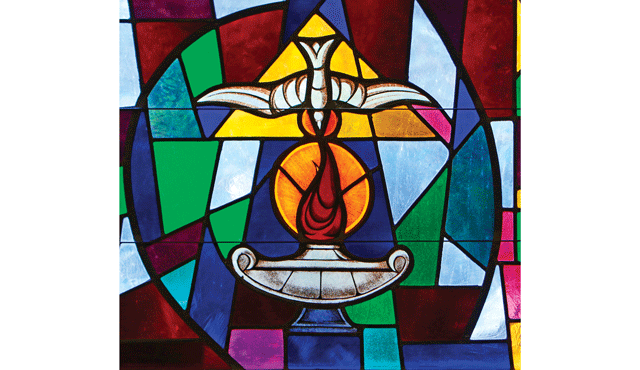“It is impossible to believe on our own. Faith is not simply an individual decision which takes place in the depths of the believer’s heart, nor a completely private relationship between the ‘I’ of the believer and the divine ‘Thou,’ between an autonomous subject and God. By its very nature, faith is open to the ‘We’ of the Church; it always takes place within her communion.”
– Pope Francis, Encyclical “Lumen Fidei,” On Faith, June 2013
If you ever have moved from one parish to another, you likely noticed a difference between each parish’s faith formation efforts.
In one parish, for instance, diocesan rules for preparation for the sacrament of confirmation may require a one- or two-year preparation; rules also may differ for preparation for baptism or other sacraments.
That’s because while the Vatican sets international standards for faith formation, individual dioceses use those basic principles to establish their own guidelines for adult education and sacramental preparation.
“The Vatican articulates the theology of what content should cover, but they do not prescribe methods or timeline, so this is why you might see in some countries very brief preparation for the sacraments as opposed to United States dioceses,” explains Katie Dawson, the Diocese of Orange director of Parish Faith Formation.
In fact, Dawson says, she and her fellow parish faith formation professionals agree that diocesan rules for infant baptismal preparation are one area that needs review and, ultimately, new instructions.
“My colleagues are looking at infant baptism as an area we need to redesign,” she notes. “We are in this post-Christendom reality where our systems were built around the expectations that we all know the Catholic faith – what it means to live as a Catholic. In the environment we’re in today that’s no longer the case.”
The United States Conference of Catholic Bishops prescribes that goals and content of catechetical efforts in each diocese “will embrace all the faith dimensions of an adult life.”
Furthermore, the USCCB says, “Our adult faith formation ministry must engage the particular needs and interests of the adults in each local community. To be faithful and effective it will offer, over time, a comprehensive and systematic presentation and exploration of the core elements of Catholic faith and practice—a complete initiation into a Catholic way of life. It will do so in a way that is accessible to adults and relates to their life experiences, helping them to form a Christian conscience and to live their lives in the world as faithful disciples of Jesus.”
For guidance, the USCCB notes in “Our Hearts Were Burning Within Us: A Pastoral Plan for Adult Faith Formation in the United States,” three major goals must guide and direct efforts in adult faith formation:
Invite and enable ongoing conversion to Jesus in holiness of life.
“As its first goal, faith formation helps adults ‘to acquire an attitude of conversion to the Lord.’ This attitude fosters a baptismal spirituality for adults. It leads them to recognize and repent of sin in their hearts and lives, to seek reconciliation through the sacraments, and to embrace the invitation and challenge of an ever-deepening faith in Jesus.”
- Promote and support active membership in the Christian community.
“As adult believers, we learn and live our faith as active members of the Church. Accordingly, faith formation helps adults make ‘a conscious and firm decision to live the gift and choice of faith through membership in the Christian community,’ accepting ‘co-responsibility for the community’s mission and internal life.’”
- Call and prepare adults to act as disciples in mission to the world.
“The Church and its adult faithful have a mission in and to the world: to share the message of Christ to renew and to transform the social and temporal order. This dual calling to evangelization and justice is integral to the identity of the lay faithful; all are called to it in baptism. Accordingly, faith formation seeks to help each adult believer become ‘more willing and able to be a Christian disciple in the world.’”
In the United States, Dawson says, priests and religious women historically handled every parish’s faith formation efforts. “The first lay person receiving a degree in theology did so in the 1960s,” she explains. “In the ’70s and ‘80s there was the emergence of a profession as lay people began doing faith formation, and there was a significant effort to professionalize that role and make sure lay persons would be qualified and respected.”
Dawson says an emphasis in strong, conscientious parish faith formation efforts increasingly are important because it’s apparent some Catholics maintain a casual relationship to their faith. “I’ve had someone tell me they are a good Catholic because they go to Mass on Easter and Christmas,” she recalls. “We need to evaluate how we prepare the faithful to receive the sacraments.”


